The Spectrophotometers Market is estimated to be valued at USD 1.7 billion in 2025 and is projected to reach USD 2.6 billion by 2035, registering a compound annual growth rate (CAGR) of 4.2% over the forecast period.
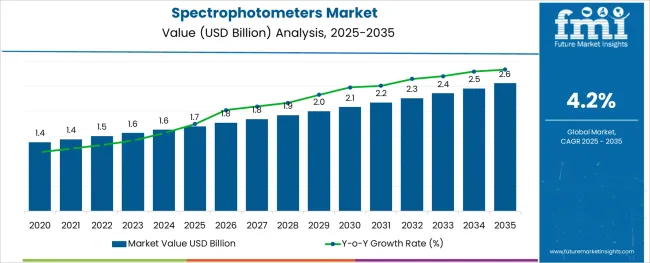
The spectrophotometers market has been evolving with the rising focus on analytical accuracy and process optimization in laboratory testing and industrial research. The demand for precision analytical instruments has been steadily increasing as industries enhance their focus on quality control and compliance. Laboratories and production facilities have been adopting spectrophotometers for accurate material characterization and concentration analysis across a wide range of compounds.
Innovation in instrument design and the incorporation of digital interfaces have made these devices more user-friendly and adaptable to modern laboratory workflows. Shifts in global healthcare and chemical industries have accelerated the use of spectrophotometers in drug discovery and material testing processes.
The ongoing trend toward automation and data integration in laboratory operations is also expected to sustain market growth. Segmental expansion is being shaped by Double Beam Spectrophotometers in instrument type, Molecular Spectrophotometry in technology, and the Pharmaceutical Industry as the leading end user due to their growing analytical demands.
The market is segmented by Instrument Type, Technology, and End User and region. By Instrument Type, the market is divided into Double Beam Spectrophotometer and Single Beam Spectrophotometer. In terms of Technology, the market is classified into Molecular Spectrophotometry, Atomic Spectrophotometers, and Mass Spectrometry. Based on End User, the market is segmented into Pharmaceutical Industry, Biotechnological Industry, Government Agencies, Academic & Research Institutes, Healthcare Industry, Chemical & Petrochemical Industry, and Others. Regionally, the market is classified into North America, Latin America, Western Europe, Eastern Europe, Balkan & Baltic Countries, Russia & Belarus, Central Asia, East Asia, South Asia & Pacific, and the Middle East & Africa.
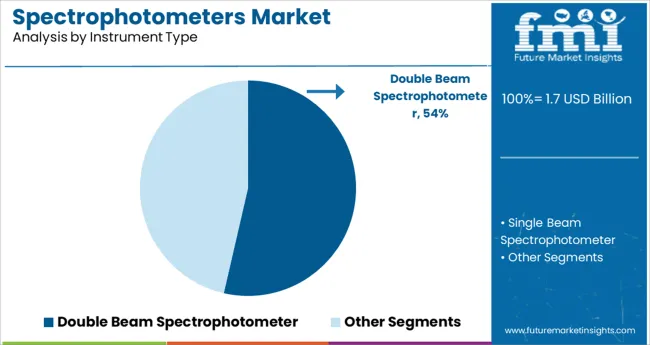
The Double Beam Spectrophotometer segment is projected to account for 53.6% of the spectrophotometers market revenue in 2025 maintaining its position as the leading instrument type. This segment has gained traction because of its ability to provide stable and accurate readings by compensating for fluctuations in light source intensity and sample variability.
Researchers and quality control professionals have favored double beam configurations for their consistency in long-duration experiments and their suitability for a wide range of sample types. Double beam instruments have been adopted in academic laboratories, pharmaceutical research, and industrial quality assurance processes where measurement reliability is essential.
The simplicity of calibration and minimal operator intervention required for these devices have made them an integral part of laboratory instrumentation. As laboratories seek dependable tools for routine and advanced analysis the Double Beam Spectrophotometer segment is expected to maintain a strong presence in the market.
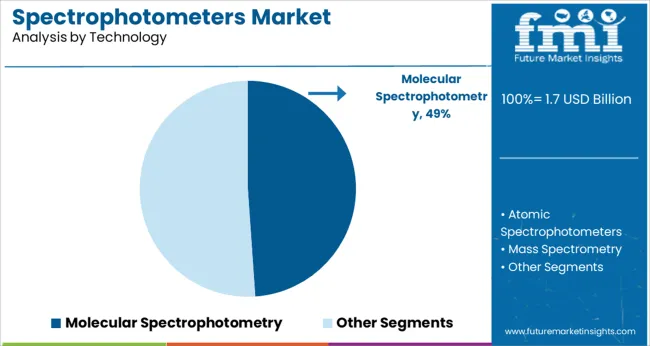
The Molecular Spectrophotometry segment is expected to contribute 48.9% of the spectrophotometers market revenue in 2025 reflecting its dominance in analytical technologies. This growth has been supported by the broad applicability of molecular spectrophotometry in analyzing chemical compounds, biomolecules, and reaction processes.
Laboratories engaged in chemical synthesis and life sciences have widely applied this technology for qualitative and quantitative analysis. Molecular spectrophotometry has been recognized for its precision in detecting molecular absorption characteristics and for its compatibility with various sample preparation methods.
Additionally, the technology has been continually refined to support automated workflows and data capture systems enhancing operational efficiency. As analytical processes in research and production environments continue to evolve the Molecular Spectrophotometry segment is expected to remain at the forefront of spectroscopy technologies.
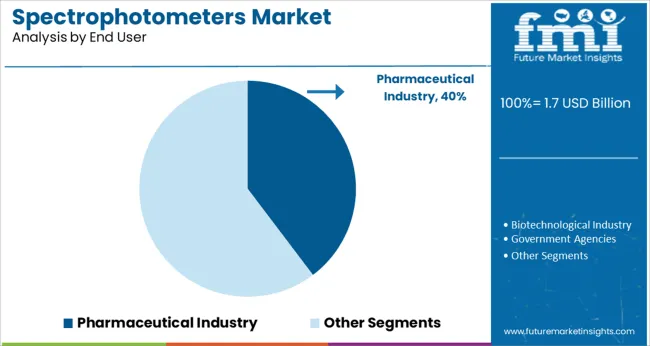
The Pharmaceutical Industry segment is projected to hold 39.7% of the spectrophotometers market revenue in 2025 sustaining its leadership in end-use adoption. Growth of this segment has been driven by the increasing analytical requirements of pharmaceutical companies for drug formulation, stability testing, and regulatory compliance.
Spectrophotometers have been widely used in pharmaceutical quality control laboratories to ensure the consistency and purity of active pharmaceutical ingredients and finished products. The pharmaceutical sector has emphasized the need for reliable and repeatable measurement techniques to meet stringent industry standards.
Additionally, the use of spectrophotometers in analytical method development and validation has supported their continued demand in drug discovery and manufacturing processes. As pharmaceutical companies expand their research and production capabilities the Pharmaceutical Industry segment is expected to remain the largest consumer of spectrophotometry solutions.
Spectrophotometry has been used in the majority of laboratories for the detection of chemicals. Hence, fuelling the demand for spectrophotometers.
Sales of spectrophotometers are being boosted by increasing demand for drug discovery and development and biomolecular analysis from the life science industry.
Increasing applications of spectrometry devices in toxicology, proteomics, and disease marker contribute to the growing demand for spectrophotometers around the globe.
Demand for spectrophotometers dwindles as they are costly, and the lack of skilled professionals is the restraint of the spectrophotometers market.
Concerns about the proper usage of sphere spectrophotometers are one of the elements predicted to act as a barrier to sales of spectrophotometers in the near future.
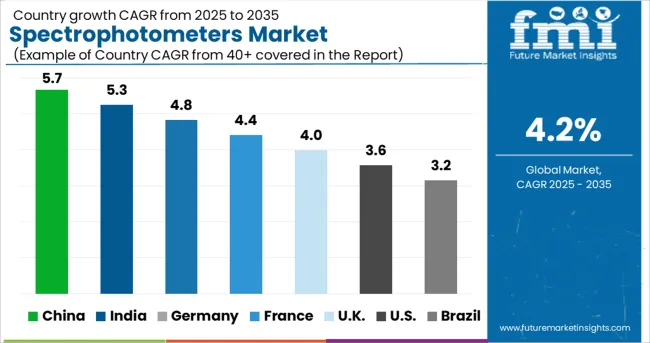
Advanced regions like North America and Europe hold a high spectrophotometers market share due to significant spending power.
North America is expected to maintain its dominant position in demand for spectrophotometers. It exhibits significant growth in the spectrometers market, owing to the increased launch of novel products in the region by key players.
Technological advancement and widening applications in various segments will also contribute to the higher demand for spectrophotometers in the region.
According to a survey conducted by the European Union (EU) R&D scoreboard, investments in overall R&D in Europe, including the healthcare sector, increased significantly, which is expected to spike the sales of spectrophotometers.
Asia Pacific countries are anticipated to witness a huge growth in the sales of spectrophotometers rate in the spectrophotometers market.
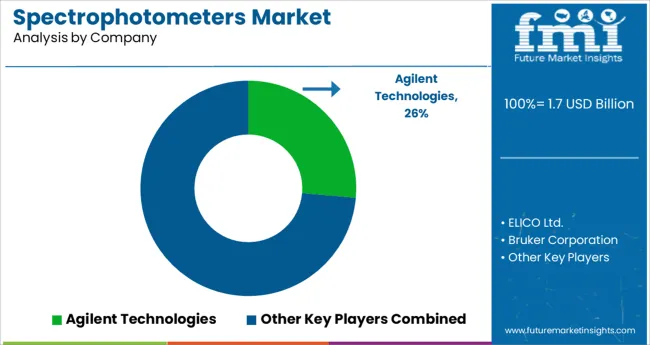
Some of the key players in the spectrophotometers market are Agilent Technologies, Bruker Corporation, Perkin Elmer, Inc., ThermoFisher Scientific, Inc., Danher, Inc. Water Corporation, Shimadzu Corporation, Bio-Rad Corporation, and others.
Key players have been adopting various strategies such as mergers & acquisitions, collaborations, partnerships, and product launches to consolidate their position in the market by enlarging their spectrophotometers market share.
| Report Attributes | Details |
|---|---|
| Growth rate | CAGR of 4.2% from 2025 to 2035 |
| Base year for estimation | 2024 |
| Historical data | 2020 to 2024 |
| Forecast period | 2025 to 2035 |
| Quantitative units | Revenue in USD million, volume in kilotons, and CAGR from 2025 to 2035 |
| Report coverage | Revenue forecast, volume forecast, company ranking, competitive landscape, growth factors, and trends, Pricing Analysis, |
| Segments covered | Type, Application, Region |
| Regional scope | North America; Western Europe; Eastern Europe; Middle East; Africa; ASEAN; South Asia; Rest of Asia |
| Country scope | USA, Canada, Mexico, Germany, UK, France, Italy, Spain, Russia, Belgium, Poland, Czech Republic, China, India, Japan, Australia, Brazil, Argentina, Colombia, Saudi Arabia, UAE, Iran, South Africa |
| Key companies profiled | Agilent Technologies; Bruker Corporation; Perkin Elmer, Inc.; ThermoFisher Scientific, Inc.; Danher, Inc. Water Corporation; Shimadzu Corporation; Bio Rad Corporation; others |
| Customization scope | Free report customization (equivalent to up to 8 analysts working days) with purchase. Addition or alteration to country, regional & segment scope. |
| Pricing and purchase options | Avail customized purchase options to meet your exact research needs.? |
The global spectrophotometers market is estimated to be valued at USD 1.7 billion in 2025.
It is projected to reach USD 2.6 billion by 2035.
The market is expected to grow at a 4.2% CAGR between 2025 and 2035.
The key product types are double beam spectrophotometer and single beam spectrophotometer.
molecular spectrophotometry segment is expected to dominate with a 48.9% industry share in 2025.






Full Research Suite comprises of:
Market outlook & trends analysis
Interviews & case studies
Strategic recommendations
Vendor profiles & capabilities analysis
5-year forecasts
8 regions and 60+ country-level data splits
Market segment data splits
12 months of continuous data updates
DELIVERED AS:
PDF EXCEL ONLINE

Thank you!
You will receive an email from our Business Development Manager. Please be sure to check your SPAM/JUNK folder too.
Chat With
MaRIA